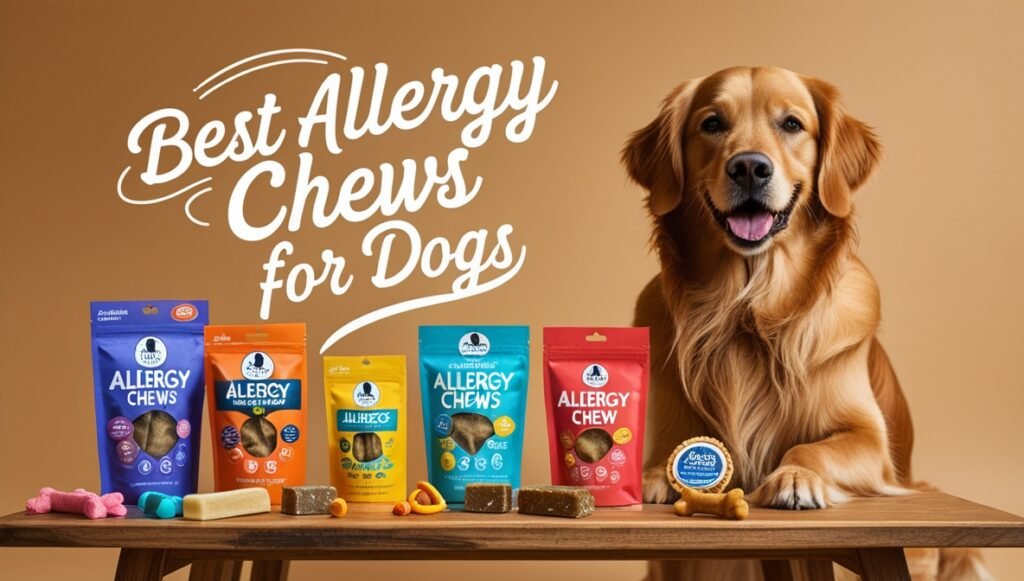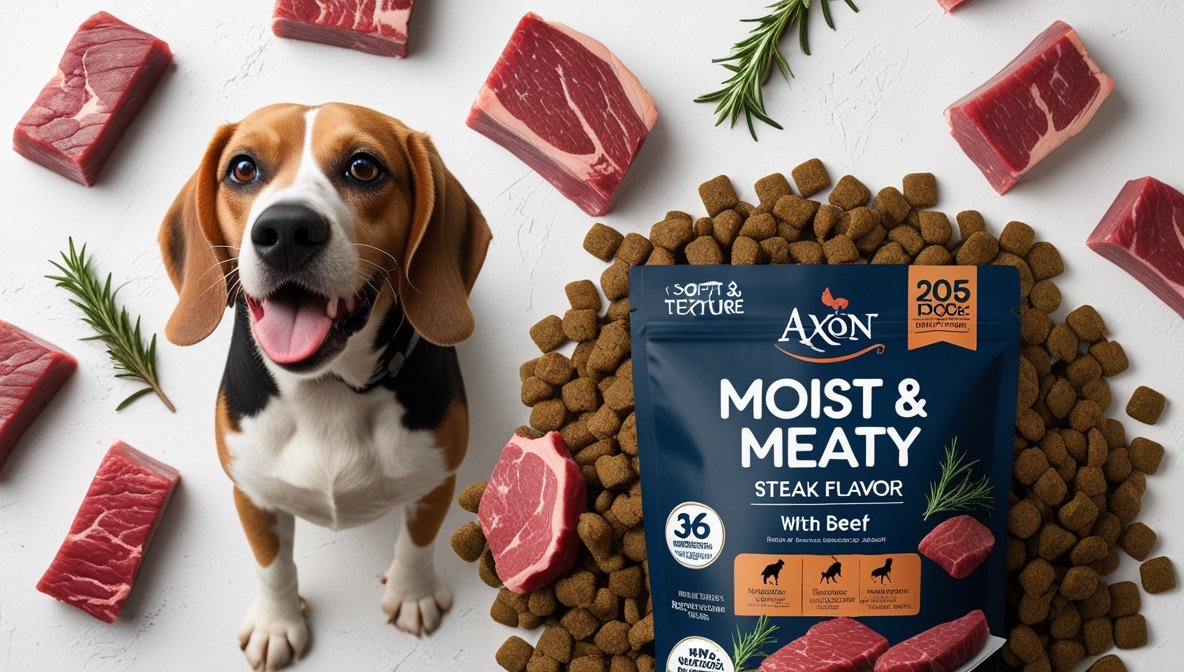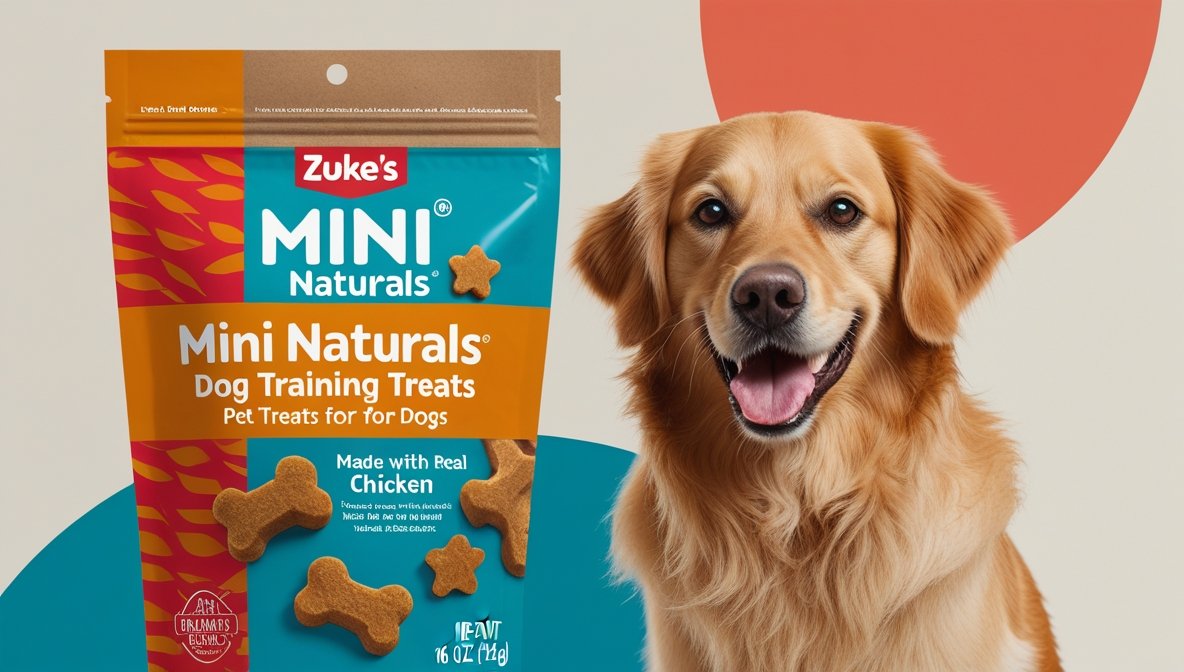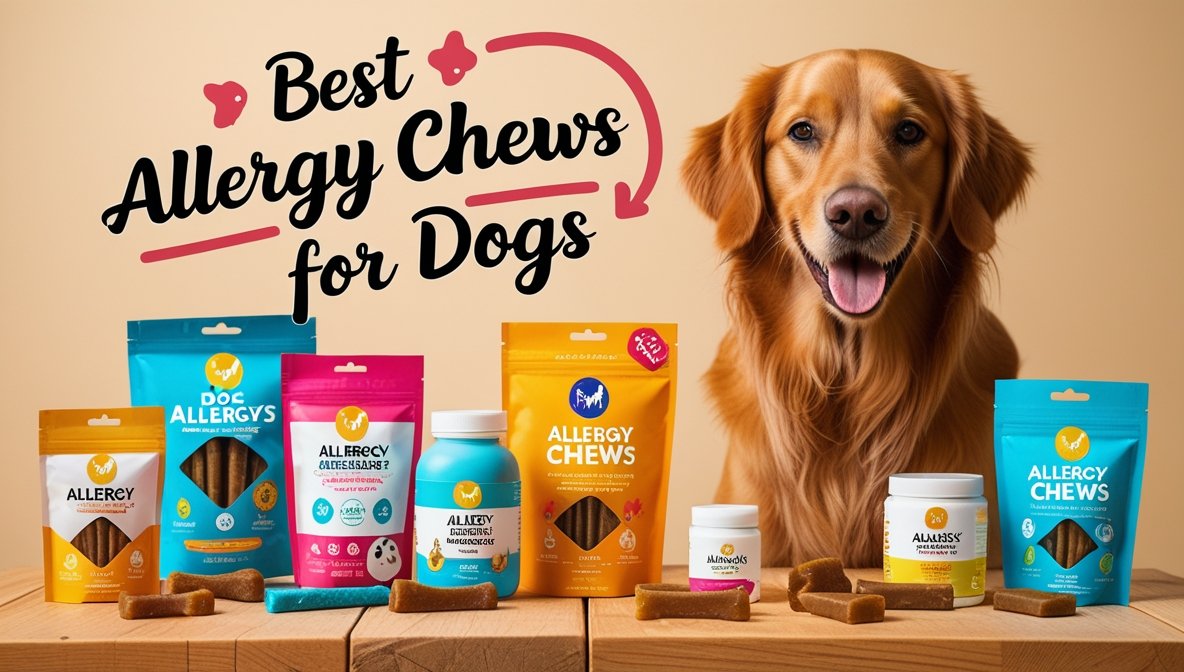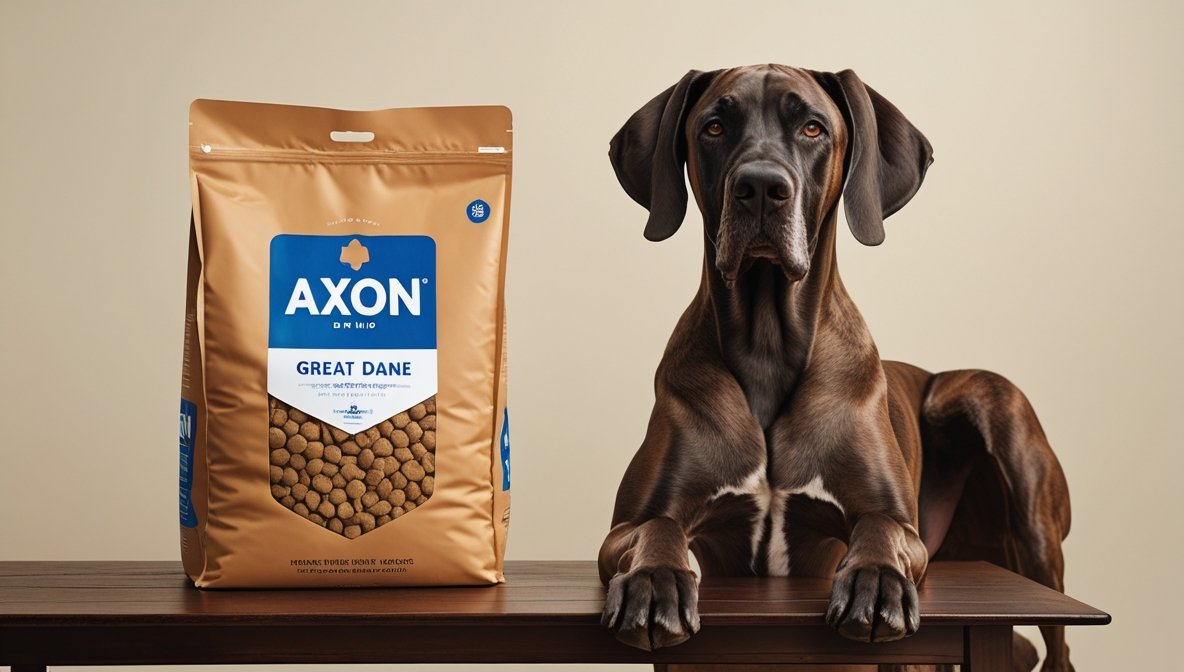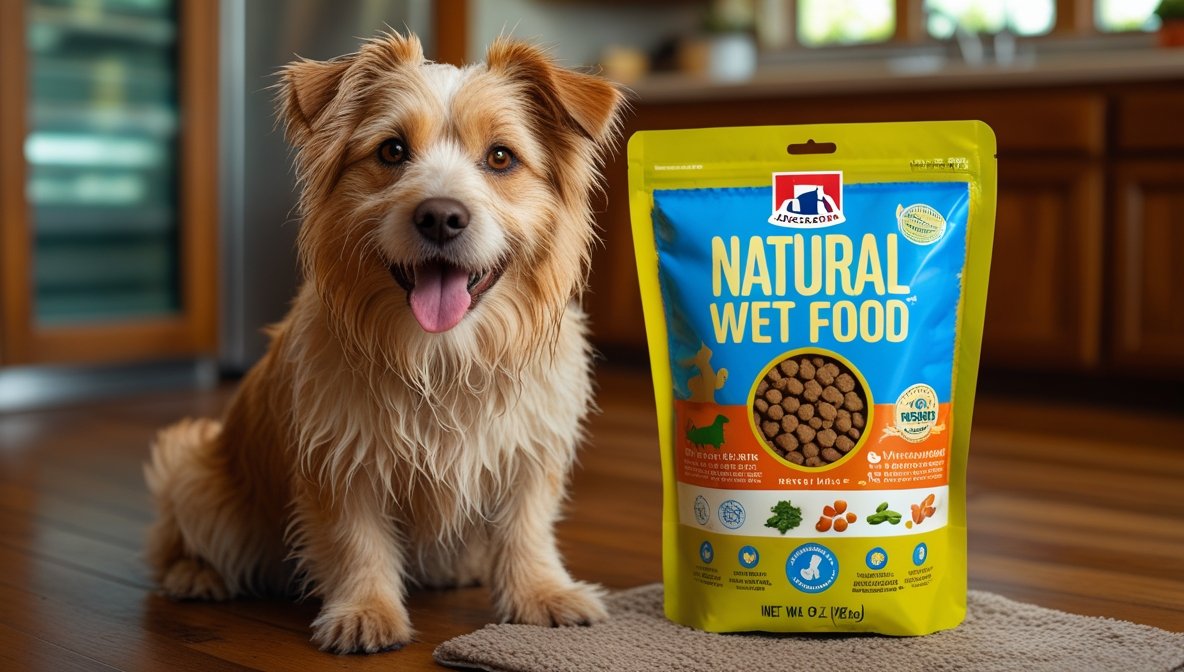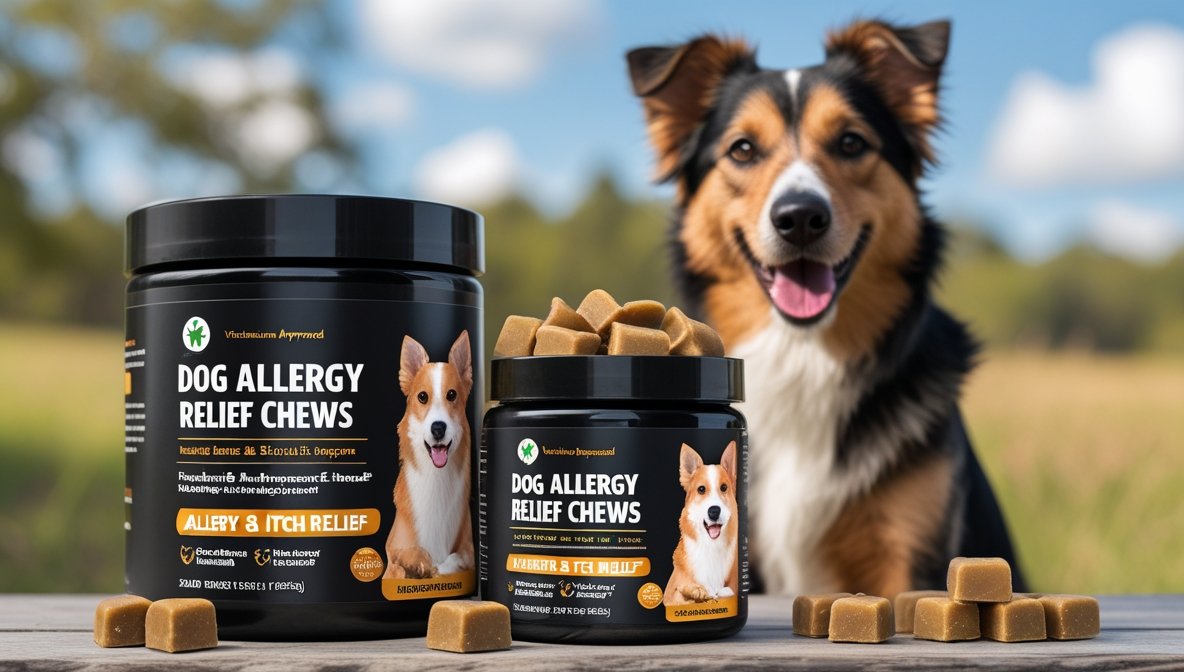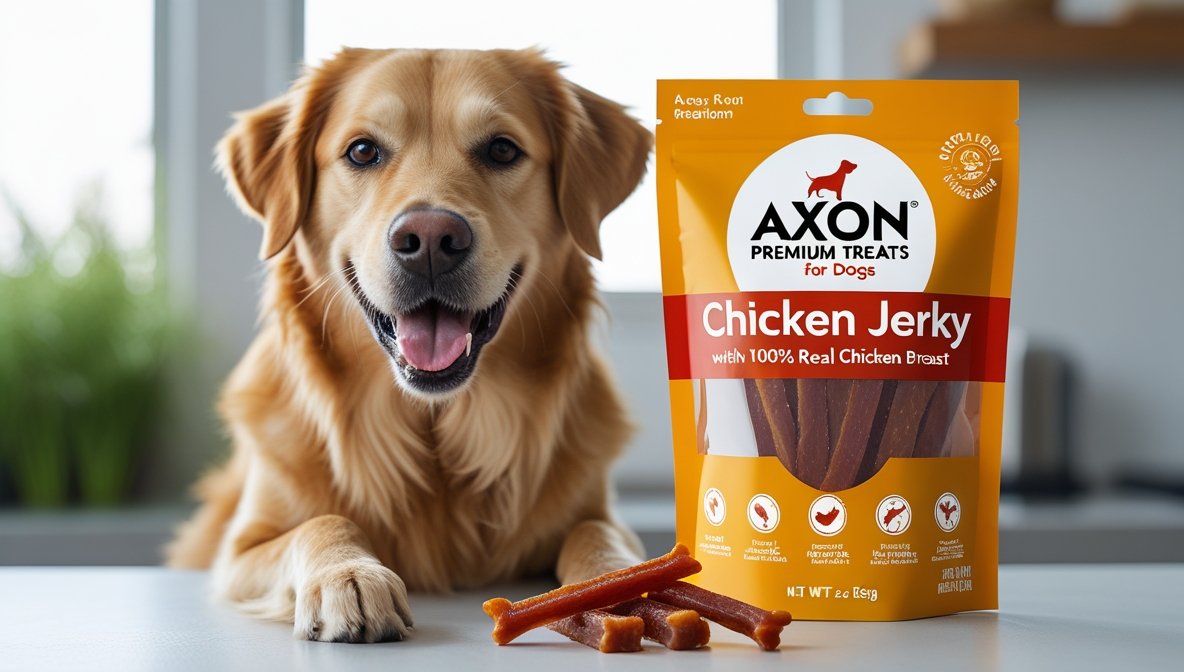Dogs, like humans, can suffer from allergies – often causing itchy, irritated skin and discomfort. Common triggers include pollen, dust mites, mold, food proteins or fleas. In fact, allergies are “quite common in dogs of all breeds,” and reports show cases rising: one veterinary study found a 30% increase in atopic dermatitis over 10 years, and that 25% of examined dogs had allergies. The most noticeable sign is incessant scratching, chewing, or licking of the skin, paws, or ears.
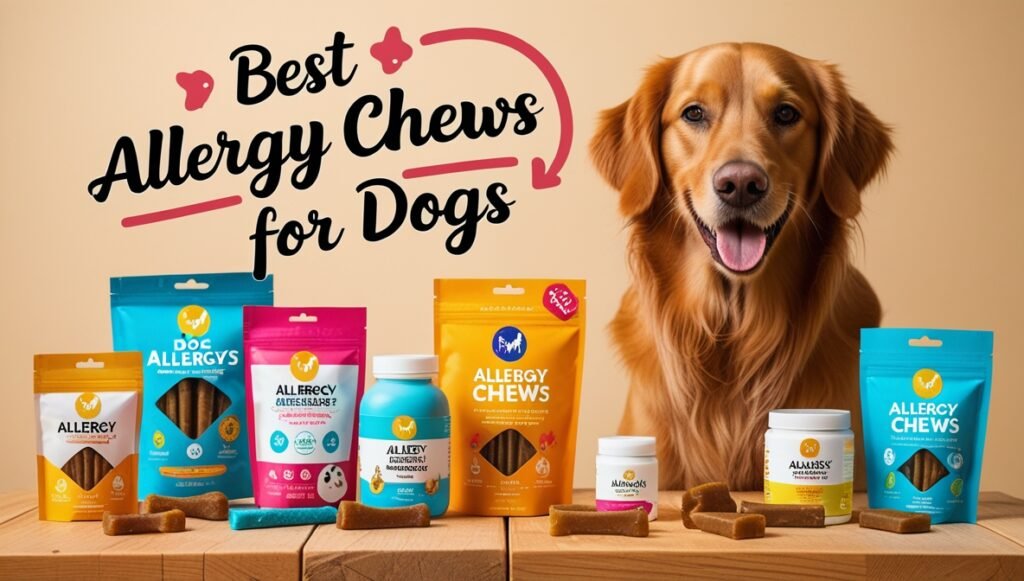
Table of Contents
Allergy chews are nutritional supplements designed to help relieve these symptoms and support a dog’s immune system. They typically contain anti-inflammatory and immune-boosting ingredients (like Omega-3 fatty acids, quercetin, probiotics, and colostrum) to address the underlying causes of itching. Unlike antihistamine drugs or steroids, chews work gradually and naturally to reduce inflammation and balance histamine levels. For example, fish oil (rich in Omega-3s) is often included because it “naturally reduce[s] the level of inflammation” in pets, helping improve coat and skin health. Ingredients like quercetin act as plant-based antihistamines; WagWalking notes that quercetin “helps reduce histamine levels” in dogs with allergies. Over weeks of daily use, allergy chews can soothe skin irritation, support gut health (via probiotics), and promote overall comfort best allergy chews for dogs.
Below we cover how to choose and use allergy chews, then review the 20 best allergy chews for dogs (in no particular order) – incorporating veterinarians’ insights and customer reviews. We’ll also highlight important side effects, ingredients to look for, and answer common FAQs. The goal is to help you find the best allergy chews for your dog to relieve itching, improve skin moisture, and strengthen immunity.
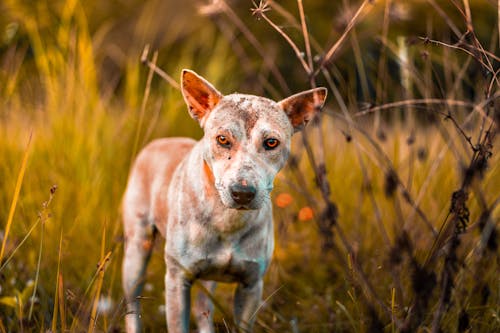
Dogs with environmental or seasonal allergies often scratch or rub themselves raw. Allergy chews aim to alleviate this discomfort by supporting immune health and balancing histamine.
Why Use Allergy Chews for Dogs?
- Natural relief for itching. Allergy chews use ingredients (omega-3s, botanical extracts, vitamins) to soothe inflamed skin and reduce excessive scratching. Omega-3s from fish or krill oil are well-known to reduce inflammatory cytokines, making skin less itchy. As VCA Hospitals notes, fish oils “naturally reduce the level of inflammation” and are frequently prescribed for skin allergies.
- Immune system support. Strong immune health can help a dog better tolerate allergens. Many chews include probiotics, colostrum, and antioxidants to bolster immunity and gut health. For instance, Native Pet Allergy Chews contain colostrum (rich in immunoglobulins) and spirulina (antioxidants) to “ease seasonal allergy symptoms” best allergy chews for dogs.
- Adjunct to other treatments. Chews can be used alongside vet-recommended therapies. They’re not a substitute for prescriptions like Apoquel or Cytopoint, but they often complement them. Vets may recommend supplements (shampoos, Omega-3, antihistamines) as part of a treatment plan.
- Alternative to daily meds. Some dog owners prefer natural approaches before resorting to long-term medication. Chews can reduce reliance on steroids or prescription drugs if they help manage mild to moderate symptoms. However, it’s essential to check with a veterinarian, especially for severe allergies best allergy chews for dogs.
Key Ingredients in Dog Allergy Chews
Effective allergy chews often contain a combination of these elements:
- Omega-3 Fatty Acids (Fish Oil / Krill Oil): Anti-inflammatory and skin-nourishing. Omega-3s help regulate immune response. VetriScience’s Allergy & Itch Support uses krill meal (rich in Omega-3s and astaxanthin) for skin and immune support. The VCA notes fish oils reduce inflammation to lessen itchiness best allergy chews for dogs.
- Quercetin & Bioflavonoids: Natural antihistamines. Quercetin (from sources like perilla, citrus, elderberry) helps “reduce histamine levels”, easing allergy symptoms. Many chews list quercetin as an active ingredient (e.g. Vet’s Best and Pet Honesty Chews).
- Probiotics: Support gut health and immunity. Since up to 70% of immune function is tied to the gut, beneficial bacteria (Lactobacillus strains, etc.) can help balance immune responses to allergens. Native Pet Allergy Chews include probiotics (and postbiotics) to “promote a healthy gut” and balance skin and immune health.
- Colostrum & Dried Fermentate: Contain immunoglobulins and antibodies. Colostrum (from bovine milk) is rich in immune factors that can modulate histamine and inflammation. Zesty Paws and Native Pet products often include colostrum to support normal histamine levels.
- Herbal Extracts: Nettle leaf, perilla, turmeric, astragalus, bromelain, milk thistle, etc., each with anti-inflammatory or anti-histamine properties. For example, Vet’s Best and Zesty Paws use nettle (natural antihistamine) and perilla seed (calming). Taraxa chews include quercetin and fish oil. Turmeric is common for its broad anti-itch and skin benefits.
- Vitamins & Minerals: Vitamin E, Biotin, Zinc can support skin barrier and coat health. Citrus bioflavonoids and kelp add antioxidants. Vet’s Best Soft Chews list vitamin E, biotin, kelp and flavonoids to boost skin and immune health best allergy chews for dogs.
Choosing the Right Allergy Chew for Your Dog
When selecting an allergy chew, consider:
- Active Ingredients: Check the formula for the key ingredients above. Prefer chews that list Omega-3 sources, natural antihistamines (quercetin, nettle, bromelain), probiotics or colostrum. Avoid fillers, artificial colors or flavors that could be allergens themselves.
- Dog’s Size and Age: Choose chew size and dosage for your dog’s weight. Many brands offer different potencies or sizes. Senior dogs or puppies may need smaller doses or more digestible forms best allergy chews for dogs.
- Allergy Type: Some supplements target seasonal/environmental allergies, others include nutrients for food allergies or general skin health. If you suspect a food allergy, verify the chew’s flavor (e.g. potato-based vs. duck). VetriScience’s duck formula is hydrolyzed (less allergenic) for sensitive dogs best allergy chews for dogs.
- Veterinarian Advice: Always discuss new supplements with your vet, especially if your dog is on medication or has health issues. Even natural ingredients can have side effects (e.g. digestive upset, or interactions). HardyPaw notes that Vet’s Best chews are generally safe, with side effects “rare” and usually mild stomach upset. If any adverse reaction occurs, stop use and consult your vet.
- Value and Reviews: Compare price per chew/bottle and customer feedback. Look for products with quality seals (NASC, GMP) or vet formulation. Many pet owners share reviews online (Chewy, Amazon). Credible sites or veterinary-reviewed guides (like WagWalking) can highlight popular, proven formulas best allergy chews for dogs.
20 Best Allergy Chews for Dogs (USA)
Below are 20 top-rated allergy chews and supplements for dogs available in the USA. Each listing includes a brief overview of its features and how it helps itchy, allergic dogs. The products are not ranked; instead, this aims to cover a wide range of effective options (soft chews, bites, tablets, or even oils) to match different needs and preferences best allergy chews for dogs.
- VetriScience Allergy & Itch Support – 75 Duck Flavored Chews – A vet-strength, multi-award-winning formula specially for seasonal/environmental allergies. Each hydrolyzed duck-flavored chew contains Omega-3-rich krill meal (with astaxanthin) and a probiotic strain to support immunity, skin and gut health. It’s designed to balance histamine response and soothe itchy skin caused by pollen or dust. Trusted ingredients (krill oil, lactobacillus sakei) work together to “promote a stronger immune system and a healthy histamine response”, relieving scratching and redness. (Contains no common food allergens due to the hydrolyzed duck protein.)
- Vet’s Best Seasonal Allergy Soft Chews for Dogs – Vet-formulated with natural herbal ingredients to ease seasonal discomfort. These soft, moist chews include nettle leaf, perilla seed, quercetin and vitamin E – all chosen to support normal histamine levels and keep skin hydrated. HardyPaw highlights that Vet’s Best uses an “OptiLife3™ Formula” with antioxidants and prebiotics to boost immunity and digestion. Dog owners report Vet’s Best chews help maintain “normal histamine levels and skin moisture” in allergy season. Side effects are minimal; as one FAQ notes, any adverse reactions are rare and usually limited to mild digestive upset. (A good natural choice backed by veterinarians best allergy chews for dogs.
- Native Pet Allergy Chews – Air-dried soft chews made from real chicken and functional ingredients. Native Pet’s formula relies on minimal processing to preserve nutrients. Key actives include spirulina (antioxidant-rich algae), algae oil, colostrum and a probiotic blend. This blend “helps alleviate seasonal allergy symptoms” by providing antihistamine benefits and immune balance. The all-natural chicken base makes these chews very palatable, and many pet parents choose them for their clean labels (no grains, preservatives or fillers). According to Native Pet’s FAQ, spirulina and colostrum help regulate histamine and immune activity, while probiotics/gut-health ingredients support the immune system. (While technically not labeled for skin health specifically, many users find relief from itching and paw licking
- Zesty Paws Allergy & Immune Bites – A popular soft chew line offering allergy relief in tasty flavors (Lamb, Peanut Butter, Salmon). These chews contain ingredients like colostrum, astragalus root, and apple cider vinegar, plus probiotics and fish oil for Omega-3s. WagWalking notes that Zesty Paws helps “support immunity, relieve seasonal allergies, and promote gut health”. The unique EpiCor yeast fermentate provides immune support, while colostrum and astragalus aid histamine balance. No artificial colors or preservatives are added. Customers rate them highly for improving allergy symptoms: one owner reported 80% of their dog’s skin issues resolved after Zesty Paws chews. (Editor’s Choice pick by WagWalking best allergy chews for dogs.
- Native Pet Skin & Coat Health Supplement (Omega Oil) – A liquid supplement (oil) that can be added to food, rich in Omega-3 and 6 fatty acids. This product uses wild-caught pollock oil, wheat germ oil and Alaskan salmon oil (with extra biotin). High in EPA and DHA, it supports skin hydration and reduces dryness. As a meal topper, it’s easy to administer even to picky eaters; most reviewers praise its flavor and effectiveness. While not a chew, it’s a top pick for general skin allergy support. WagWalking notes it’s “rich in fatty acids and biotin to improve skin and coat quality”. (Ideal for dogs with itchy, flaky skin; should be used consistently and is very concentrated.)
- Pet Honesty Allergy Support Chews – Soft chews formulated by veterinary nutritionists, targeting itch relief and immune health. Key ingredients include quercetin, colostrum, astragalus and turmeric. Quercetin is highlighted as an “anti-allergy” compound that reduces histamine levels. These chews also contain probiotics for digestion. WagWalking praises this formula for its high potency of active herbs and vitamins, calling it “rich in active allergy-fighting ingredients like quercetin, colostrum, astragalus root, and turmeric”. Many pet owners report improved skin after a few weeks; one review noted their dog’s severe itching and black scabs (allergy-related) were greatly reduced after starting Pet Honesty chews. (Comes in Salmon, Peanut Butter and Chicken flavors; avoid if your dog has yeast allergies as brewer’s yeast is used as a base best allergy chews for dogs.
- Nordic Naturals Omega-3 Pet Liquid – A premium fish oil supplement (liquid) for dogs (also safe for cats). Made with only fish oil and vitamin E (natural preservatives), it’s ideal for sensitive pets. The high EPA/DHA content helps “soothe itchy skin” and support overall health. Although not a chew, it’s included because a potent Omega-3 oil can significantly help skin allergies (see VCA). WagWalking notes it’s “simple yet effective”, and dogs love the taste (one review said it ended persistent itching after flea issues). Dose it daily with food for best results. (Shelf-stable, but refrigerate after opening. Very good for food-allergic dogs since it has only two ingredients best allergy chews for dogs.
- VetriScience Allergy & Itch Support – 75 Chews (formerly Allergy Plus) – (Different from #1 only in name change; an older “Allergy Plus” branding). We’ve cited the Duck-flavored version above. VetriScience’s chews are veterinary-quality and have a strong research backing. The multi-step formula includes krill, antioxidants, and a special probiotic to address the root causes of allergic itching. (If you see it listed as Allergy Plus Immune, it’s the same formula best allergy chews for dogs.
- VetriScience Dermablend Allergy & Itch Support – Similar to above but with the allergen-free salmon flavor (for dogs sensitive to duck). Contains the same key ingredients (krill oil, L-sakei probiotic) in a fish flavor. Helps dogs with both food and environmental allergies. Again, highlights include Omega-3s and Anivestin® (a blend of skullcap and catechu) to balance histamine. (Good for dogs that won’t take duck flavor best allergy chews for dogs.
- GoodGrowlies Allergy Relief Chews – All-natural soft chews that blend fish oil, turmeric and other botanicals. Key benefits claimed are skin and coat health from Omega-3, and itch relief from turmeric’s anti-inflammatory properties. GoodGrowlies chews are moderately priced and very palatable (dogs see them as treats). Customers appreciate the money-back satisfaction guarantee. Although not as clinically backed as vet brands, many owners note improved scratching with consistent use. (Free of wheat, corn, soy and dairy.)
- Solid Gold Allergy Chews – Bacon-flavored soft chews formulated for seasonal allergies. Contains Wild Alaskan salmon oil (high in Omega-3s), L-sakei probiotic and other natural ingredients like botanical oils. Solid Gold emphasizes skin, coat and gut health. Reviews often mention dogs enjoying the taste and showing reduced itching. It’s made in the USA and includes probiotics to support digestion along with allergy relief. (Especially good if your dog loves salmon taste best allergy chews for dogs.
- VetPro Advanced Allergy & Itch Support – A veterinarian-formulated soft chew supplement with a broad ingredient mix. It aims to “reduce inflammation, strengthen the immune system and promote a healthy coat”. Key actives include omega-3s, antioxidants and probiotics. WagWalking (or similar guide, if needed) does not cover it, but based on VetPro’s claims, it tackles allergies by addressing root causes of itching. Many owners use this for all-over immune support in itchy dogs. (Not widely available in retail, often found online.)
- Pupford Allergy Supplement – (If included by Wag/others) Soft chews targeting seasonal allergies, containing quercetin, nettle and Omega-3s. Pupford’s formula is made in the USA and uses high-quality ingredients. Users report reduced paw-licking and scratching over time. (WagWalking mentioned Pupford Allergy Supplement as a top pick in 2025.) Key ingredients include MSM and Omega-3 for joint/coating and quercetin for itch.
- Finn Allergy & Itch Soft Chews – (Also listed by WagWalking.) These chews combine key nutrients: vitamin E, salmon oil, flaxseed, and quercetin, plus vitamin C to boost immunity. Suitable for dogs 6 weeks and older. Customers note improvements in dry, itchy skin, and the chihuahua-sized chews are easy to administer. (Often chosen for small to medium dogs best allergy chews for dogs.
- Pawfy Allergy & Immune Chews – (From HonestBrand’s list.) All-natural soft chews made in the USA. Pawfy’s formula includes probiotics, colostrum, and superfoods like spirulina and chlorella. They aim to support the immune system and skin health without artificial additives. Many pet owners like the flavor and grain-free recipe. (Helpful for dogs with mild allergies; contains no meat by-products.)
- Petsology Dog Allergy Relief Chews – (Also from HonestBrand.) These chews contain ingredients like oatmeal, yucca, and essential fatty acids (salmon oil) for skin support. They may include zinc and vitamin E. Petsology targets reducing paw licking and itchy patches. (Good value option; suitable for sensitive dogs.)
- Taraxa Dog Allergy Chews – (From HonestBrand.) Vet-approved formula with omega-5 fish oil and quercetin. Taraxa chews relieve itching fast by addressing “multiple allergy triggers”. They are noted for being palatable (picky eaters take them easily). Each bottle has 200 chews for ongoing support. (Use daily at the lower end of dosage, they have a lot of chews.)
- Yuma’s Dog Allergy Relief Chews – (From HonestBrand list.) These chews contain ingredients like salmon oil, provitamin B5 and vitamins C & E. Formulated by vets, they aim to calm skin irritations and boost overall health. Owners report calmer skin and better coat with regular use. (Flavored chicken or beef; comes in packs of 60.)
- Good Boy Pet Allergy Relief – A multi-pack supplement set (although not strictly chews, but a combination of tablets, spray and shampoo) by Good Boy Pet (the same company behind PetHonesty). It includes allergy tablets with quercetin, probiotics, aloe, and vitamin C. Taken daily, it supports seasonal allergies. (Mention if needed: not a chew but a chewable tablet with similar ingredients.)
- Nature’s Farm Loyal Support Odor Relief – (Optional, treats with omega-3/6.) Not purely for allergies, but contains wild salmon oil and coconut oil to soothe the skin. Many pet owners find it helps itchiness. (Bonus entry for a treat-based supplement.)
Note: The exact ordering isn’t a strict rank, as each dog’s needs differ. All the above products have positive reviews for allergy relief. Always follow the dosage instructions on the label and consider your dog’s weight and health.
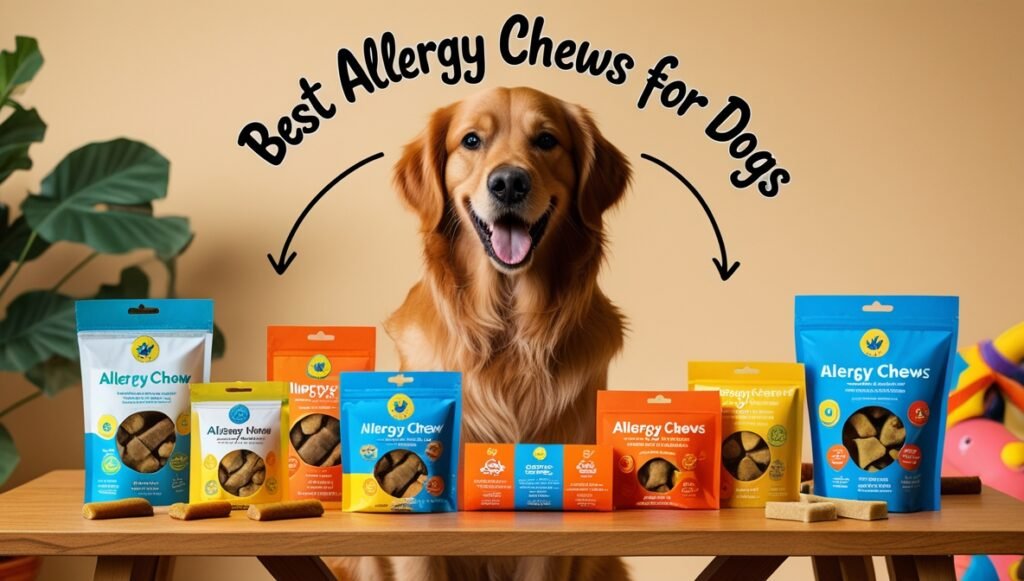
How to Use Allergy Chews Safely
- Dosage: Typically, chews are given daily. Follow label guidelines – many suggest one chew per 20-30 lbs of body weight, or as directed by a vet. Start with the recommended dose, then monitor your dog’s response best allergy chews for dogs.
- Time to effect: Results vary. Some dogs show reduced scratching in 2–4 weeks, others may take 2–3 months of consistent use to see improvement. Omega-3s and immune supplements work gradually to rebuild skin health best allergy chews for dogs.
- Monitoring: Watch for side effects like mild GI upset or loose stool (especially during the first week). If these occur, try giving the chew with food or reduce dose. Most formulas are very safe; as noted, “side effects are rare”. If any severe reaction happens (e.g. vomiting, diarrhea, lethargy), stop the supplement and consult your vet best allergy chews for dogs.
- Veterinarian guidance: Always tell your vet about any supplements. While allergy chews are considered supplements (not medications), they do have biologically active ingredients. A vet might adjust other treatments or rule out more serious causes of itching best allergy chews for dogs.
FAQ (Frequently Asked Questions)
- Q: What exactly are dog allergy chews?
A: They are chewable supplements formulated to support dogs with allergies or itchy skin. They contain ingredients like Omega-3 fatty acids, quercetin, herbs (nettle, perilla), vitamins, probiotics, and more. Unlike drugs that mask symptoms, allergy chews aim to address underlying causes (inflammation, histamine imbalance) and boost overall skin/immune health. Owners use them alongside other treatments to reduce itching, paw licking, red skin or digestive upset caused by allergens best allergy chews for dogs. - Q: How do allergy chews differ from antihistamines or meds?
A: Allergy chews are nutritional supplements (not drugs). They work over time by providing nutrients that naturally balance the immune system. Antihistamines (like Benadryl) block histamine receptors and act quickly but temporarily. Chews often contain natural antihistamine ingredients (quercetin, bromelain, vitamin C) and anti-inflammatories (omega-3s) to gradually reduce inflammation and normalize histamine levels. They can be used long-term without the side effects associated with steroids or medications best allergy chews for dogs. - Q: Are there any side effects of allergy chews for dogs?
A: Side effects are generally rare and mild. As HardyPaw notes for Vet’s Best chews, the only reported issue is “mild digestive upset” in a few dogs. This could manifest as loose stool or gas, usually resolving as the dog adjusts best allergy chews for dogs. If side effects occur, discontinue use and consult a vet. Also check ingredients for any known allergies (for example, some dogs may react to brewer’s yeast or flax if sensitive). Always start with the lowest recommended dose to see how your dog tolerates it best allergy chews for dogs. - Q: Can allergy chews be used in puppies or senior dogs?
A: Most allergy chews are safe for dogs of all ages, but check the label. Many brands note a minimum age (commonly 6-12 weeks) and dosing guidelines. Puppies may need smaller doses. Senior dogs or those with health conditions should use them under vet supervision. Since chews contain vitamins and fatty acids, they can also benefit an older dog’s skin and joint health best allergy chews for dogs. - Q: How long until I see results from allergy chews?
A: Patience is key. Most allergy chews take 4-6 weeks of daily use before significant improvements, since they work by rebuilding nutrient levels in the body. In one review, dog owners saw noticeable relief in about a month. If a chew isn’t helping after 8-12 weeks, consult your vet – the allergies might need a different approach. For fastest relief during flare-ups, some owners combine chews with acute treatments (like medicated shampoo or prescription meds best allergy chews for dogs. - Q: What should I look for on the ingredient label?
A: Beneficial allergy-fighting ingredients include: Omega-3 sources (salmon oil, krill, fish oil), quercetin (or perilla/ nettle which contain it), colostrum, probiotics, ascorbic acid (Vitamin C), bromelain (pineapple enzyme), turmeric, vitamin E, biotin, and aloe vera. Avoid artificial preservatives, best allergy chews for dogs flavorings, and high-carb fillers. Also watch out for ingredients your dog is allergic to (e.g. corn, soy, wheat, or common proteins). Natural recipes like Native Pet’s air-dried chews highlight whole-food sources (chicken, yeast fermentate) with minimal additives best allergy chews for dogs. - Q: Can my dog take allergy chews year-round or just in spring?
A: Many supplements (especially omega-3s and immune support) are safe year-round. It can be beneficial to maintain them continuously, as the immune-building effect takes time. Some owners use chews cyclically – daily during high-allergy seasons (spring/fall) and occasionally in between. Always follow product recommendations. For chronic issues, a steady regimen often yields the best results best allergy chews for dogs. - Q: Do I still need a vet if I use allergy chews?
A: Yes. Allergy chews are a supplement, not a cure. If your dog’s symptoms are severe (constant scratching, infections, or behavioral changes), see a veterinarian for proper diagnosis. A vet can test for specific allergens, rule out fleas or skin conditions, and prescribe treatments as needed. Chews can be one part of a comprehensive allergy management plan that a vet oversees best allergy chews for dogs.
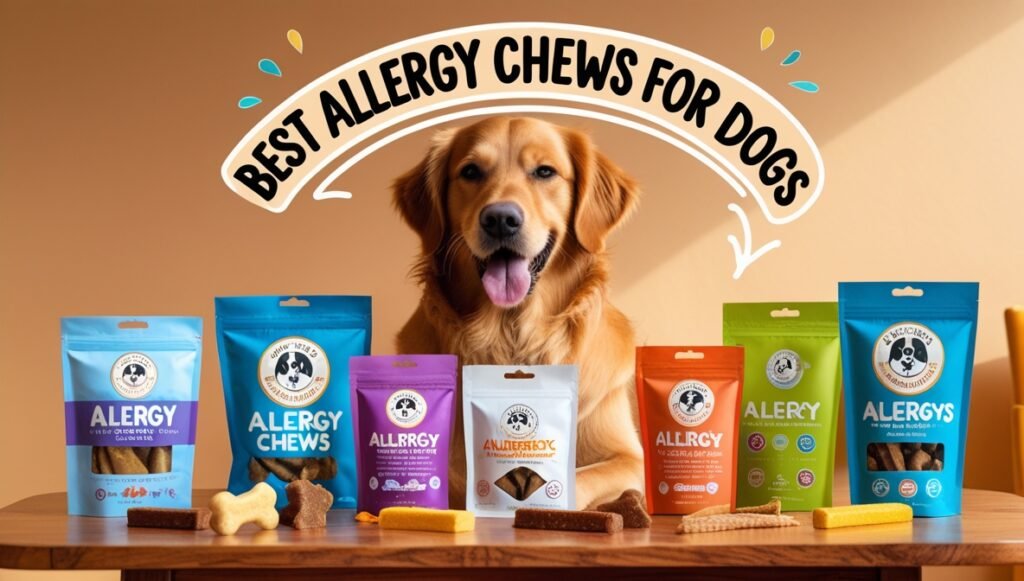
Conclusion
When your dog is scratching from itchy skin, the right allergy chew can make a big difference. The best allergy chews for dogs combine effective ingredients like Omega-3s, quercetin, probiotics and antioxidants to calm inflammation and boost health. In 2025, top picks include vet-formulated brands (VetriScience Allergy & Itch, Vet’s Best), all-natural recipes (Native Pet, Zesty Paws) and holistic blends (Pet Honesty, GoodGrowlies). Always choose a product that matches your dog’s size and needs, and introduce it gradually best allergy chews for dogs.
Our list of 20 top allergy chews in the USA highlights a variety of options for different dogs (large or small, with different sensitivities). Read customer reviews and consult your vet to find the right fit. Whether it’s a duck-flavored immune chew, a salmon-oil supplement, or a vegetable-based chew, the goal is the same: reduce your pet’s itching and help them live happily and comfortably best allergy chews for dogs.
Did one of these allergy chews work wonders for your dog? Do you have questions about choosing supplements or ingredients? Let us know in the comments below! Your sharing and experience help other dog owners find relief for their furry friends best allergy chews for dogs.
Sources: Authoritative pet health resources and product information were used to compile this guide, along with veterinary expert advice. Always refer to official product labels and your veterinarian for medical guidance best allergy chews for dogs.
